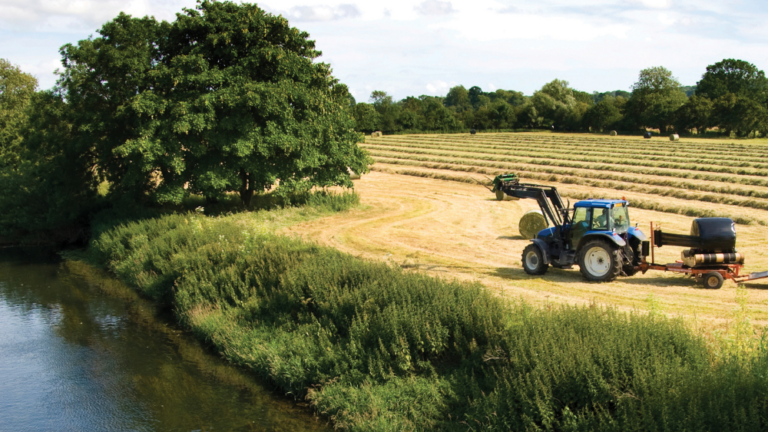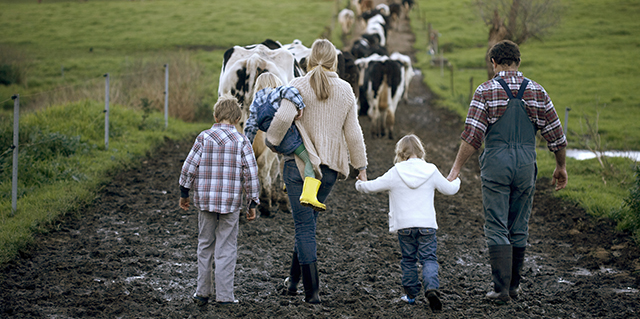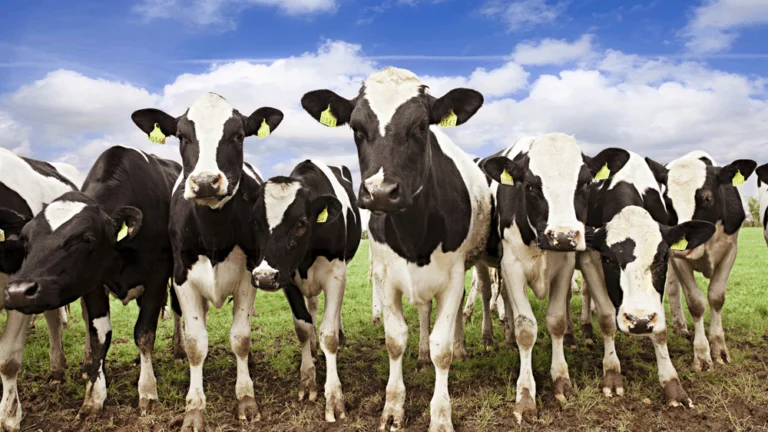
Challenges in the dairy industry
The UK dairy industry has faced a multitude of economic challenges over the last few years. From fluctuating milk prices to shifting consumer preferences and regulatory changes, dairy farmers and stakeholders have had to adapt to survive.
Volatile profitability and input costs
A perpetual challenge that the UK dairy industry faces is the fluctuation of milk prices. Farmgate milk prices – weighted averages of cheese and butter, skim milk powder, whole milk powder, and whey – have suffered as a result of inconsistent macroeconomic trends. During 2021 and 2022, there was a 30% price increase to 60%, surging to an all-time high in mid-2022.
However, consumers found it difficult to keep up with the costs, which ultimately led to a decline in demand and milk prices. Dairy farmers are highly dependent on the price they receive for their milk, which is influenced by global supply and demand, production costs, and government policies.
Many farmers are struggling to cover their production costs due to low milk prices. This has led to financial stress and, in some cases, forcing farmers out of business. The ongoing volatility in milk prices makes it difficult for dairy businesses to plan for the long term and invest in necessary improvements. In December, the UK average farmgate milk price hit a record 51.51p per litre, but prices have since fallen dramatically as Defra reported a 29.2% drop in June to 36.48p per litre.
Nearly a tenth of British dairy farmers are expecting they will cease to produce milk by 2025. Another 23% of farmers say they are not certain their business will continue milk production much beyond the next two years. 84% of British dairy farmers are worrying about input costs, such as feed prices or energy prices, and 80% claim that cashflow and profitability are factors that could restrain milk supplies.
Potential solutions:
- Diversification – diversify income streams by venturing into other agricultural activities or by offering farm-related services
- Contract farming – enter into contracts with dairy processors that provide price stability to help shield from drastic price fluctuations
- Industry co-operation – collaborative efforts within the industry to negotiate better terms with dairy processors and retailers can also contribute to price stability
Evolving consumer preferences
Consumer preferences for dairy products are continually evolving – prompted by factors such as health concerns, environmental consciousness, and dietary trends. The rise of plant-based alternatives and a shift toward reduced dairy consumption have impacted the traditional dairy industry. While dairy remains a staple in the British diet, demand is dwindling at an annual rate of -1.6%, according to IBISWorld. The estimated consumption of milk in the UK in 2023-24 is expected to drop to 1.2 litres per capita per week.
In 2017, the European Court of Justice passed legislation that plant-based products would henceforth have restrictions on marketing themselves with the words “milk,” “cheese,” “butter,” or “yoghurt”. By EU law, these terms are reserved for animal products only. The partial reason behind this is to ensure consumers, particularly the younger generation, are aware about the differences of dairy and non-dairy products, and the nutritional merits of dairy products.
Potential solutions:
- Innovation – invest in research and development to create new dairy products that align with changing consumer preferences
- Diversification – produce both traditional dairy and plant-based products to cater to a wider market
- Education – educate consumers about the nutritional benefits of dairy and the sustainability practices of the industry to retain and attract customers
Environmental regulations
The dairy industry has come under scrutiny for its environmental impact, including greenhouse gas emissions, land use, and water consumption. With the Environment Act placing pressure on farmers to make expensive updates to their farms, Sainsbury’s have set out to provide an additional £6m support to their supplying dairy farmers. The supermarket giant is also committing £1.7m towards sustainability bonuses for farmers reducing their environmental impact. They are particularly focused on carbon reduction through activities, such as switching to sustainably sourced animal feed and improving waste management.
However, transitioning to sustainable practices can be costly and challenging for many farmers, especially smaller operations. According to the NFU, 91% of dairy farmers say that the scope of investment needed for developments such as suitable slurry storage – to comply with environmental regulations – is the main reason dissuading them from increasing milk production.
Potential solutions:
- Subsidiary support – incentivising dairy farmers to adopt sustainable practices and invest in environmentally friendly technologies
- Consumer education – transparent communication about sustainable practices within the dairy industry so consumers make informed decisions that support environmentally responsible producers
- Collaboration – sharing best practices and resources within the industry to facilitate the adoption of sustainable methods by more dairy farmers
In conclusion, the UK dairy industry has always been resilient, adapting to economic challenges throughout its history. However, the current landscape presents a unique set of obstacles that require innovative solutions and collaboration among all stakeholders, including farmers, processors, legislators, and consumers.
By addressing issues like fluctuating milk prices, evolving consumer preferences, sustainability concerns, and continuing Brexit-related uncertainties, the UK dairy industry can work toward a more stable and prosperous future. With the right strategies and support, dairy farmers and businesses can continue to provide high-quality dairy products to consumers while contributing to a more sustainable and resilient agricultural sector.
We understand the dairy sector is facing a multitude of challenges but recognise there are opportunities. We provide essential financial expertise to help clients make important decisions. From managing budgets, cash flow, and succession planning – we can help every step of the journey. We are also aware of the importance of detailed understanding that stretches beyond tax and accounts, and we pride ourselves on talking your language.
Please get in touch using the form below for further information on how we can help.












